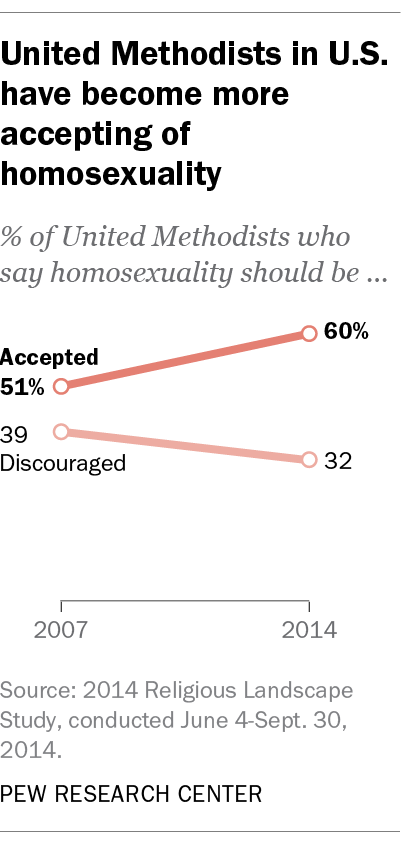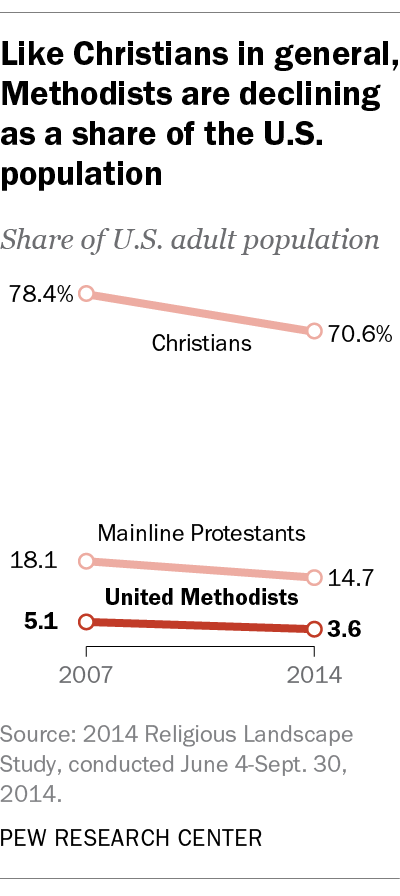After years of debate, United Methodist Church leaders voted this week to reaffirm the denomination’s opposition to same-sex marriages and openly gay clergy. As a result, many of the more liberal-leaning congregations are expected to leave the denomination, amounting to a schism in America’s largest mainline Protestant church.
 These developments come at a time when many United Methodists in the United States have a more accepting view toward homosexuality. In Pew Research Center’s 2014 U.S. Religious Landscape Study, 60% of United Methodists said homosexuality should be accepted by society – a clear majority, and a substantial increase from 2007, when 51% said this. In addition, about half of U.S. Methodists (49%) said they favored legal same-sex marriage.
These developments come at a time when many United Methodists in the United States have a more accepting view toward homosexuality. In Pew Research Center’s 2014 U.S. Religious Landscape Study, 60% of United Methodists said homosexuality should be accepted by society – a clear majority, and a substantial increase from 2007, when 51% said this. In addition, about half of U.S. Methodists (49%) said they favored legal same-sex marriage.
That survey was conducted nearly five years ago, and Americans’ views about homosexuality have shifted further since the U.S. Supreme Court’s 2015 decision to legalize same-sex marriage nationwide. Members of all major religious traditions have become even more likely to favor legal same-sex marriage, according to a Pew Research Center survey conducted in 2017, the most recent year for which data are available. (That survey did not include enough United Methodists to analyze separately.)
The UMC is one of the few major mainline Protestant denominations in the United States that does not sanction same-sex marriage. The Episcopal Church, the Evangelical Lutheran Church in America, the Presbyterian Church (U.S.A.) and others have moved to embrace gay marriage in recent years. (Evangelical Protestant denominations, by contrast, have not embraced same-sex marriage.)
The internal debate over same-sex marriage and related issues comes at a challenging time for the United Methodist Church.
 Even before any departures resulting from this week’s meeting, United Methodists have been shrinking considerably as a share of the U.S. population, part of a broader trend among U.S. Christians and particularly mainline Protestants. Our 2014 study found that United Methodists make up 3.6% of the U.S. adult population – down from 5.1% in 2007. (Mainline Protestants as a whole declined from 18.1% of the adult population to 14.7% over that seven-year period.)
Even before any departures resulting from this week’s meeting, United Methodists have been shrinking considerably as a share of the U.S. population, part of a broader trend among U.S. Christians and particularly mainline Protestants. Our 2014 study found that United Methodists make up 3.6% of the U.S. adult population – down from 5.1% in 2007. (Mainline Protestants as a whole declined from 18.1% of the adult population to 14.7% over that seven-year period.)
The church also is older and less racially diverse than many others in U.S. The median age of United Methodist adults is 57, well above the national median. And 94% of United Methodists are white, much higher than the share of whites in the overall U.S. population (66%).
At the same time, the denomination has reportedly been growing elsewhere around the world – particularly in sub-Saharan Africa, where views on homosexuality tend to be very conservative. Indeed, a survey we conducted in sub-Saharan Africa a decade ago found that Christians in the region overwhelmingly said homosexuality is morally wrong, including nine-in-ten or more who held this position in countries such as Liberia, Nigeria and Kenya. The church estimated that 30% of the delegates at this week’s meeting were from Africa, while 58% were from the U.S.
Note: This post was updated Feb. 27 to reflect the United Methodist Church’s decision to maintain its opposition to same-sex marriages and openly gay clergy.



